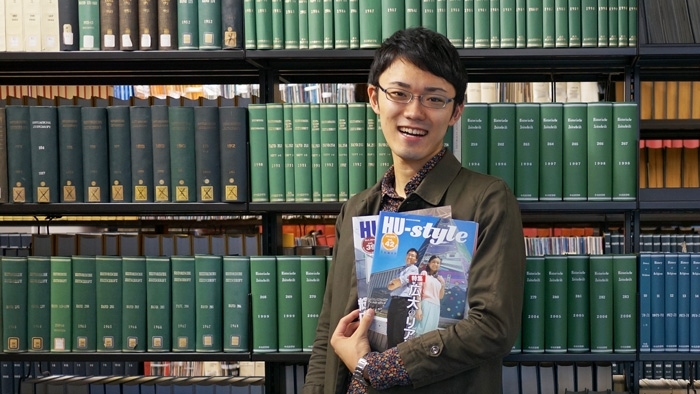
4th year, Faculty of Economics
Daichi Abe
<Graduated from Shimane Prefectural Matsue Higashi High School>
Mr. Abe experienced studying abroad in Indonesia and Taiwan, he is an editor staff of Hiroshima University’s public relation magazine “HU-style” and belongs to Hiroshima University’s broadcasting club. He says the moments that triggered his growth are when he was gathering information for the magazine or casual conversations during the study abroad. We also interviewed him about Hiroshima University’s teachers and his future goals.
Why did you apply for Hiroshima University?
The biggest reason why I chose Hiroshima University is because it was a national university. I did not think about applying for private universities. During my high school years, I wanted to become a news reporter. I thought if I’m going to be reading the news, I need to be good at law and economics! I decided to attend a national university that is strong in the social sciences field. I was deciding between Hiroshima University and another university in the Kansai area until right before I turned in my application, but my final decision was Hiroshima University.
What was the reason why you chose Hiroshima University?
After the National Center Test for University Admission, I talked to many teachers. All the teachers told me, “You’ll be okay if you go to Hiroshima University”. I also went to Open Campus with my sister and it helped to know the campus environment.
How did you overcome studying for the National Center Test?
Studying for the National Center Test wasn’t so bad because I liked studying during my high school days. Deciding on which university to apply for was a harder decision for me. After turning in my application, my attitude completely changed into “Study mode”. I was able to prepare myself for the test well because I solved all past problems up to ten years back.
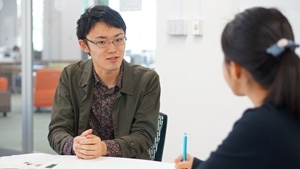
Mr. Abe says “My high school teachers pushed me to apply for Hiroshima University”
You past the entrance examination in the first try! What are you learning in the Faculty of Economics?
Conventional economic principals define that “People choose actions that maximize their own benefits”. Actually in real life situations, most people choose actions, just because. I analyzed the economic downturn by the Lehman Brothers bankruptcy with the assumption that people “make imperfect choices and actions”.
In the Faculty of Economics, everyone joins a seminar during the third year. Which seminar did you decide to join?
I joined the International Economics seminar. My mentor, Associate Professor Yasutake, supervises assuming that students “understand 100%”. Therefore he will strictly point out your mistakes during the seminar, but if you study diligently, he will help you as much as he can. Individual discussions can be as long as three hours. Other students in the same seminar study very hard. We schedule study groups on our own and help each other conduct research.
For your graduation thesis, what are you planning to research about?
The theme is a bit detached from what I have been learning in my seminar, but I plan to analyze financial problems and think about how to build better communities in rural areas of Japan. Countless financial problems are scattered throughout Japan and these problems have a direct connection to our lives. I plan to think of solutions for these problems with a sense of urgency.
Are you part of any clubs or circles?
Since May of my first year in university, I am part of the broadcasting club and editing staff of Hiroshima University’s public relation magazine called “HU-style”.
What do you do in the broadcasting club?
I was the master of ceremonies on Homecoming Day (annual event in November) and concert recital, and did live broadcasting during the university campus festival. When I was the master of ceremonies for the recital, I tried my best to interview the performer well so the audience can find out more about their personality or meanings behind their song selection (the things that cannot be seen just through their performance). The best moments are when I am interviewing the performer and I can tell the audience is having fun. I feel such a gush of happiness and it still makes me happy just thinking about those moments. I was also able to do stadium announcements in Hiroshima’s girl soccer game. I read out the players’ names and announced goals being made. There are less words to read out, but this job has more pressure. I felt a big relief and sense of accomplishment when I finished everything with no mistakes.
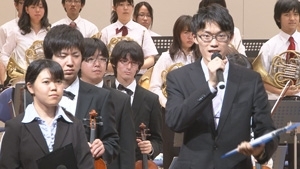
Master of ceremonies for Phoenix Concert
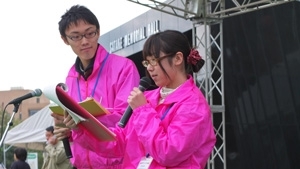
Master of ceremonies for Homecoming Day
What do you do in public relations magazine “HU-style”?
We plan feature pages and interviews, and write up articles of researchers and alumni. “HU-style” is made for Hiroshima University students, so I am always thinking through their perspective. “What kind of theme would be interesting for them?” “How should we feature Hiroshima University students? How do we make it fun?” Time flies during meetings when we discuss different ideas.
What are some of the most memorable projects/articles?
I think vol. 38 (July 2014), feature article, “What are Hiroshima University students doing?” was the most memorable. Hiroshima University has many unique students. I wanted to show that there are students with many different hobbies and interests, so we planned this article. The point was to not conduct it in an interview style, but more of an introduction of about 50 students on a 2-page spread. It was strenuous to gather materials from 50 students, but it’s a memorable article. I felt personal growth through “HU-style” activities.
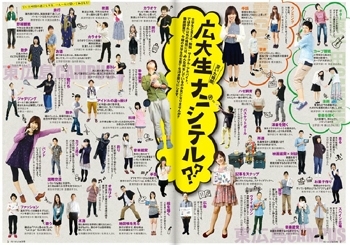
“HU-style” Volume 38 Feature page “Hiroshima University students Nanishiteru? (What are you doing?)”
In what areas do you feel you have grown?
The attitude to “thoroughly research beforehand“ has become part of me. When I was a freshman, I had an arrogant attitude toward interviews. I thought, “You don’t know how the interview is going to turn out so I should just go and listen to what they have to say”. After awhile, I realized that you can only ask good questions by researching well beforehand. When the interview for an announcer was scheduled (Volume 40, January 2015), I checked all of the programs he is casted in and thought about possible things he kept in mind while doing his job. I felt I could ask better questions and the interview went smoothly.
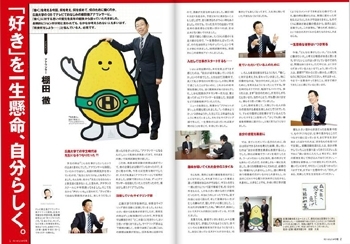
“HU-style” Volume 40 Interview
Did you experience studying abroad?
I studied abroad in Jakarta during my first year using the START program*. In my second year, I studied abroad to Taiwan using the Taiwan Short Visit** (Human Rights Development in Asia program).
*START program: The purpose of this program is to provide opportunities for younger students with less previous experiences of traveling overseas to go abroad, visit Hiroshima University’s partner universities, and experience foreign cultures and environment.
**Taiwan Short Visit (Human Rights Development in Asia program): This program provides opportunities for students to listen to lectures by local teachers, do self-investigations, and interact with students in Taiwan. It is approximately a ten-day program during summer vacation.
What made you suddenly want to go abroad?
Whenever I saw news about “Development of emerging countries” and “Decline of Japan”, it didn’t really hit me. So I thought, I should just go there and feel it myself! I applied to the START program with this in mind.
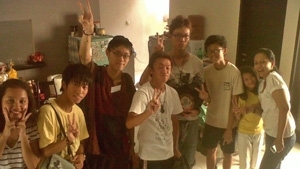
Homestay in Indonesia
What surprised you when you studied abroad?
Going to Indonesia was the first time I had ever been abroad, so I was very nervous during the START program. When it was time to interact with Indonesian students, I had no idea what to talk about. Then, a student came up to me and asked, “Hey, do you know ‘Gintama’? (Japanese gag comic). It surprised me so much! He knew things that even Japanese fans didn’t know, and we kept talking on and on. It made me so happy to think that contents like Japanese anime and comics gave this much influence on foreign people. It was what sparked our interaction and became a memorable experience for me. After this experience, I wanted to learn more about how other countries view Japan.
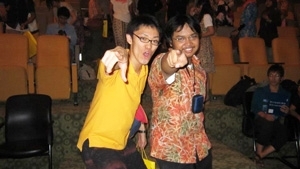
“Machine Gun Z” pose with an Indonesian student
What is your impression of Hiroshima University's “people”?
There are many warm and sincere people. I met many teachers that care about their students. When I first entered university, I was insecure and worried about many things. I was drawn to the gentle personality of my psychology teacher, and told her about my worries. Even though our faculty and major are different, I still remember how warmly she tried to help me.
My mentor, Associate Professor Yasutake, cares for me too. He will point it out if he feels I am thinking carelessly or losing passion in my research. Sometimes I would even shed tears, but it also helped me when I was job-hunting.
What are your future goals?
I was always interested in television stations and mass media. I want to send out more and more messages that inspire people. Even though the length of my study abroad was short, I realized that there are many inspiring messages that I want to send out from right around me in Japan. Now I want to contribute to rural and local areas.
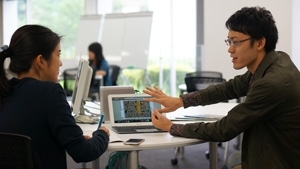
Mr. Abe talking about future goals
Finally, please give a message to your juniors that are thinking about studying at Hiroshima University!
Some people may think that going to school in metropolitan areas is more stimulating. But I think that if you choose to take action, you can broaden your chances and network as much as you want. It’s okay if you don’t know what you want to do yet. Honestly, when I was studying for my university entrance examinations, I didn’t have a clear idea what I wanted to learn or the kind of activities I wanted to participate in. But Hiroshima University has many opportunities to study abroad and take part in student activities, so you will definitely find something you want to do after you enter university. If you decide to take action, teachers and university staff with support you with full force. I hope you will continue to pursue your interests in high spirits!
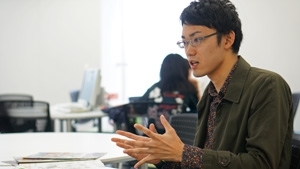
September 8, 2015
Reports: Public Relations Group (Y)
Photograph: Public Relations Group (i)
Location: Central Library


 Home
Home





